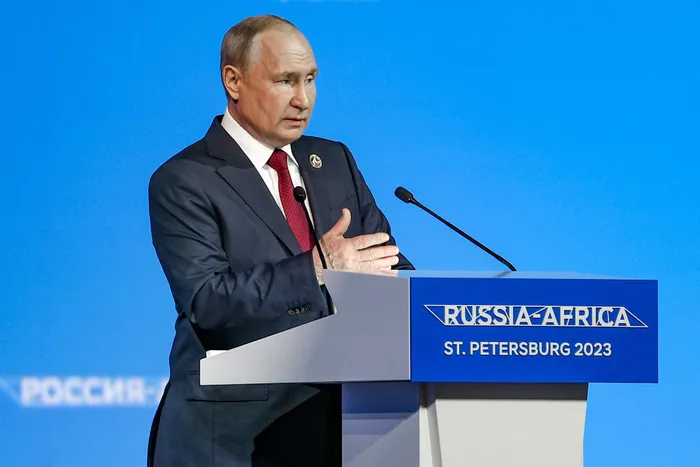Russian withdrawal another blow for nuclear arms reduction

Picture: AFP / TASS Host Photo Agency / Yegor Aleyev / July 27, 2023 – Russia’s withdrawal from the New Strategic Arms Reduction Treaty (New Start), signed by the US and Russia in 2011 to cut down their stockpiles of strategic offensive arms such as nuclear warheads, and lately from the 1996 Comprehensive Nuclear Test Ban Treaty, is one of a series of developments that have been chipping at the plank on which the post-Cold War order sits, the writer says.
By David Monyae
The post-Cold War order is slowly but surely coming undone. This is attributable to the deteriorating relations between two of the world’s great powers: Russia and the US who acted as guarantors of the global order.
One of the central planks of the order is the suite of international arms control treaties such as the Nuclear Non-Proliferation Treaty, the Treaty on the Limitation of Anti-Ballistic Missiles, the Strategic Arms Reduction Treaty, and the Comprehensive Nuclear Test Ban Treaty (CTBT).
The treaties were signed by the world’s great powers, among them the US and Russia, to avoid the arms race that characterised the Cold War era and to ensure strategic global stability. However, of late, there have been a series of developments that have been chipping at the plank on which the post-Cold War order sits.
Not least among these is the aggressive eastward expansion of Nato, North Korea’s missile-testing antics and Russia’s withdrawal from the New Strategic Arms Reduction Treaty (New Start), signed by the US and Russia in 2011 to cut down their stockpiles of strategic offensive arms such as nuclear warheads, and lately from the 1996 Comprehensive Nuclear Test Ban Treaty. The Russian President, Vladimir Putin, signed the law de-ratifying the CTBT on November 2. The CTBT was adopted by the UN General Assembly in 1996. Its terms included banning nuclear weapons tests or explosions and setting up a verification regime complete with an international monitoring system and an arsenal of confidence-building measures.
Officials in Moscow argue that the step was taken to bring Russia in line with the US which is a signatory to the treaty but never ratified it. Russia stressed that it would remain a signatory to the treaty and that it did not harbour any intentions to resume nuclear testing or violate the transparency measures that underpinned the treaty.
Notwithstanding the assurances, being a signatory to a treaty does not carry the same restraints and obligations as it did when it was ratified. The latter action means that it is domestic legislation and Russia would have been violating its own laws to conduct nuclear testing. Ratifying a treaty is a signal given by a state party to indicate its consent to be bound by the treaty. On the other hand, signing a treaty is simply an expression of an intention to comply with its terms but it is not necessarily binding.
Thus, Russia’s de-ratification of the CTBT means that the world’s two biggest nuclear powers, Russia and the US, are not bound by the treaty anymore. This tremendously undermines the international nuclear arms reduction regime which has been a vital element of the global security architecture.
What this means is that the actions of the two powers will be determined by what they think the other is doing. Without any transparent lines of communication, such as those provided under the auspices of the Comprehensive Nuclear Test Ban Treaty Organisation, it is easy to plunge the world into another era of a nuclear arms’ race like the one witnessed during the Cold War era when the world was tinkering on the brink of a nuclear war. This is because neither super- power will know what the other is up to, so the best strategy would be to stack up as many arms as possible or, even worse, to launch a pre-emptive strike.
The weakening of the CTBT Organisation as a result of the absence of the US and Russia from its membership will further undermine its ability to monitor nuclear tests and explosions across the world. Absent a hard and fast commitment from the world’s two biggest nuclear powers to refrain from a nuclear arms race, a global proliferation of nuclear arms is likely to ensue with more countries, especially China, India, North Korea and Iran, building their nuclear arsenals and thus plunging the world into an even more dangerous situation.
The prevailing atmosphere of distrust and polarisation between Russia and the US is rapidly eroding one multilateral platform after another. With bilateral relations between the two countries effectively frozen, multilateral institutions have provided a vital channel of communication and an opportunity to maintain global stability.
With the UN unable to play any meaningful role in a polarised geopolitical environment, countries with capacity, like China and India, and the EU should step up and play a more creative and proactive role to avert the breakdown of the global security architecture. It is encouraging that China has shown its willingness to take responsibility through the Global Security Initiative proposed by Chinese President Xi Jinping last year.
Its insistence on the indivisibility of global security and its embrace and acknowledgement of a multipolar world order offers a valuable opportunity to address the crumbling global security architecture. However, the current US-China tension will make it difficult for Beijing to rally global support for its otherwise plausible global security strategy.
David Monyae is Associate Professor of International Relations and Political Science, and Director of the Africa-China Studies Centre at the University of Johannesburg